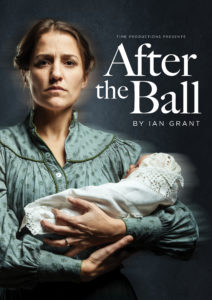After the Ball – new writing Upstairs at the Gatehouse, Highgate, London
Posted by Ian Grant | Uncategorized | No Comments
After the Ball by Ian Grant
Through the stories of the characters in After the Ball I try to express some of my core beliefs – we are what we do; what we do can never be undone; our acts have ripple (or explosive) effects long after the act itself; women and men are entirely equal; individual and state violence to other human beings is unforgiveable.
In After the Ball we follow a south London family from 1914 to 1971. A similar tale could be told about any European city family who suffered and persevered through the catastrophic wars of the 20th century. It’s a story of resilience in the face of personal trauma. It’s a story of political and social bonds that get stretched beyond breaking point. It’s story of female liberation and political emancipation and the triumphs and challenges these bring. After the Ball comes to the stage in the centenary anniversary year of the end of the First World War; on the centenary of the first votes for women in British political history; and opens on International Women’s Day, March 8th.
The play emphasises the role of the individual within a social and political context – we see women and men campaigning for the right to vote, for equality in society and for their ability to choose a way of life. We see women and men falling in love, making good and bad decisions, working as best they can to survive in a society pummelled twice in 30 years by world war. Within that framework is the key theme – that we are all individually responsible for our own actions.
The script tells the story of the characters through naturalistic scenes within a formal, poetic framework. The play moves backwards and forwards in time from 1914 to 1971. The arc of the story is emotional, not chronological. The set is an open abstract space within which the actors create their stories through the immediacy of their voices and bodies in space and time. The stage vision reflects the brightness of young hopes and the fierce bruising of experience.
I try to write rich new leading roles for older actors, and particularly older female actors. The lack of new material for some of our greatest actors is both a flaw and a huge opportunity in theatre and film today. In my work I stick to the principle that we have at least equal numbers of women and men in the cast. In After the Ball, the actors have to be highly flexible and shift their sense of older and younger selves sometimes in instant transitions across time from scene to scene. I hope the actors will find the roles meaty and satisfying.
I’m delighted to have met Nadia Papachronopoulou and to be working with her as she directs the play. Nadia is a young Greek director who has already worked extensively in British theatre, and she brings to this British story her woman’s insight and her European sensibility. In her reading of the script she has already found things I didn’t know were there, under the surface. She is the conductor to my composer, and will enrich the script through rehearsal with her high energy and artistic skill.
Ashley Cook, General Manager on the show, and Nadia have gathered together an experienced creative team. They had to assess more than 2,200 applications from actors to audition for roles in the play, which was an immense labour, but we have found a terrific cast of three women and three men to act the nine characters in the play.
I would love to see full houses during our tenancy Upstairs at the Gatehouse in Highgate, London. The production will be beautiful, engrossing and, I hope, moving. I’m excited to bring as many people as possible to see the work of the very fine acting and creative team who will embody the characters who came to me as I wrote the script.
After the Ball is the second play from our new theatrical business, Time Productions. My co-founder, Niall Bishop, and I set up the business in 2017, to create a platform for our work in the theatre and online content. Time Productions is funded by patient and curious shareholders – and we are always happy to welcome expressions of interest in investing with us.

Recent Comments